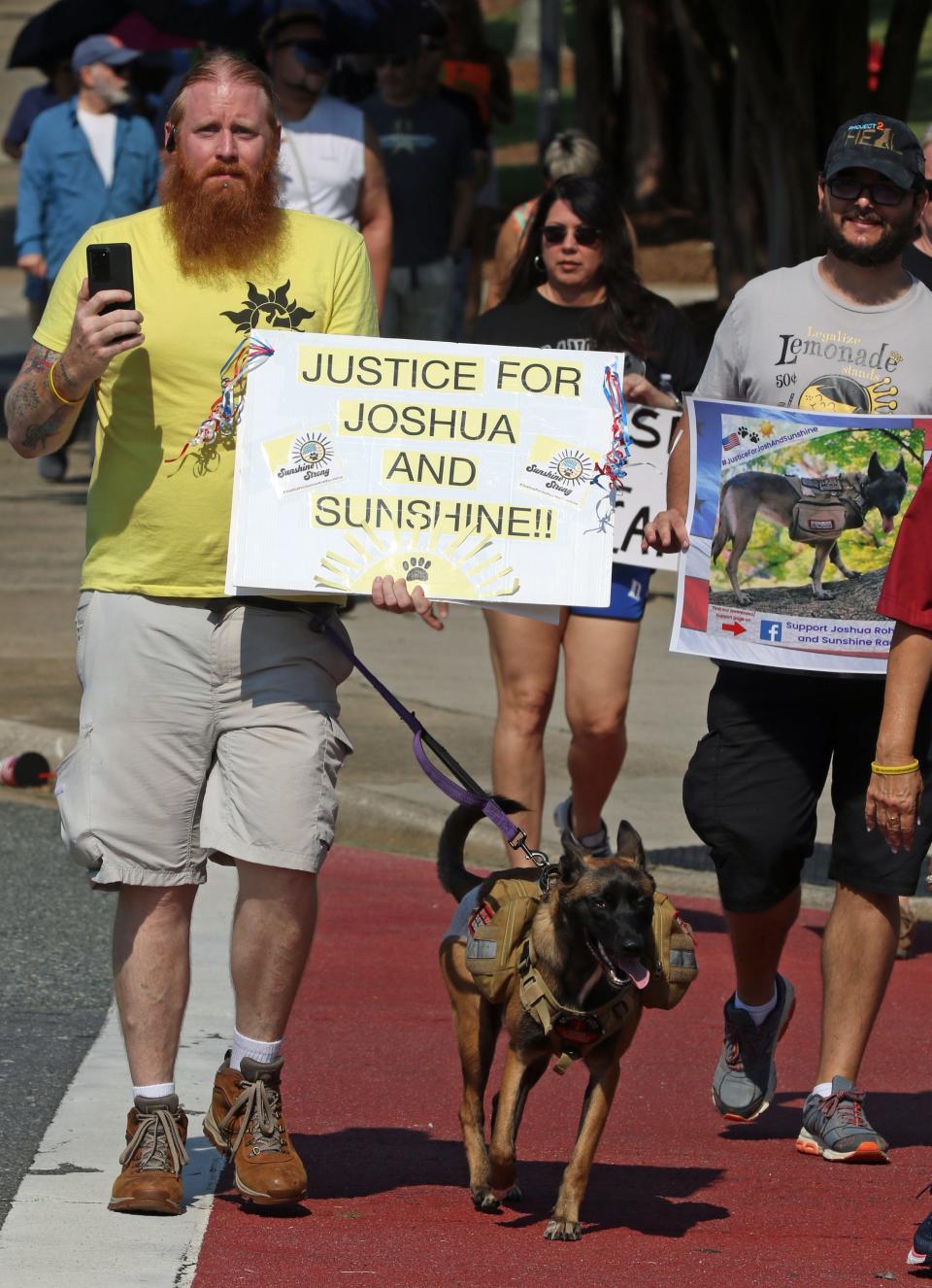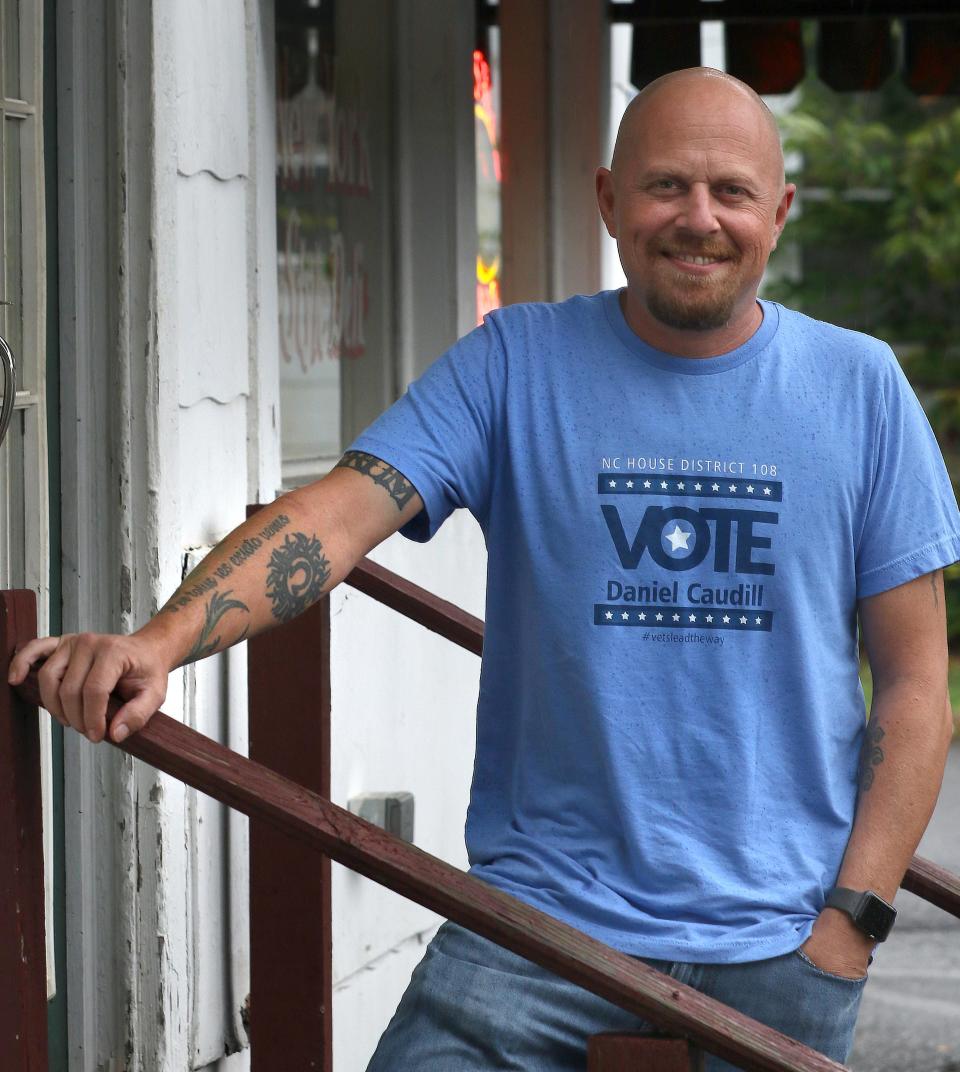Gaston starting veterans treatment court
Gaston County will soon have a veterans treatment court that will help veterans in criminal trouble access mental health care, housing, and more while addressing their criminal charges.
District Attorney Travis Page said that in his 12 years practicing law in Gaston County, he's seen veterans in District Court on charges of impaired driving, as well as drug possession and domestic violence.
"I can't tell you the exact number of how many cases, but I can tell you it's present. It's something that we can't ignore, and we have to take action," Page said.
The most prevalent case of a veteran's involvement in Gaston County's justice system recently was that of Joshua Rohrer, a then-homeless veteran who wasarrested by Gastonia Police in a conflict that went viral. Rohrer was accused of resisting arrest and begging for money near the Gastonia Target store on Oct. 13, 2021, and Rohrer's service dog, Sunshine Rae, was struck by a car and killed while he was in jail.
Around a year later, Rohrer pleaded guilty to an unrelated traffic charge, the other charges were dismissed, and he was sentenced to two years of probation and admitted into the Catawba County Veterans Treatment Court, which was intended to connect him to treatment for his post-traumatic stress disorder.

It was in a meeting with a local veterans group after Rohrer was arrested that Page learned of the Catawba County Veterans Treatment Court.
"The reason that we're starting it is because we see that a lot of our veterans that go off and serve and return home, they return home with a list of issues, mental health issues, PTSD, and then they self medicate," Page said. "We see the substance abuse issues in our courtrooms. We also see some acts of domestic violence. We're looking to provide a better service to the surrounding community, looking to prevent crime by addressing these issues, and looking to repay a debt to these veterans for their service."
"They've given so much of themselves to us and sacrificed. It's only fair that we connect them with the resources and the treatment that they need," Page added.
Rohrer said in an interview Wednesday that he hadn't had his first session in Catawba County's Veterans Treatment Court yet, but he was due to appear on Thursday, Nov. 10. But, he said, he has had a chance to view the Veterans Treatment Court and he liked what he saw.
"I observed the court once last year, when they told me about it, and like I said, it was all veterans: the judge was a veteran, the DA was a veteran, the prosecutor is a veteran," he said. "I've never seen anything like it. When you get up there, they clap for you and cheer you on. The judge is down on your level. He's not up in like the podium or whatever. You're all on the same level and you're all on the floor together. It's not as intimidating as a regular courtroom because they're there to help you."
Veterans who qualify for the program are essentially placed on probation, Page said, but "it's more intense. It's going to be more hands-on. These individuals will appear in front of a judge more frequently, perhaps even multiple times a month," he said. "They'll be working with clinicians, with social workers. It's essentially a multi-phase program."
Gaston County is looking to Catawba County for guidance as they plan the operations of the veterans treatment court.
Catawba County, under the leadership of District Attorney Scott Reilly, opened a veterans treatment court around a year ago. Currently, 20 veterans are part of Catawba County's treatment court.
Reilly said that the most important component of their veterans treatment court are mentors who are veterans themselves. Those mentors "listen to them, help them when they fall off track, make sure they get to their appointments," Reilly said.
"That's been the main component that's different than just a drug recovery court, plus the added formality of a military atmosphere," Reilly said.
Page said that Gaston County is seeking veterans who might wish to mentor other veterans as part of the treatment court.
"These veterans, yes ,they're in the program, but we fully expect them to struggle while they're in the program with these issues. They need someone they can turn to, they can call in the middle of the night, who can talk them away from a negative situation, steer them back in their recovery," Page said.
Page said that the ultimate goal of the program is rehabilitation.
"We're looking to prevent future acts of crime, looking to reduce substance abuse issues, the DWIs in the community. By addressing those issues and correcting them, I think we're optimistic or hopeful that we can accomplish those objectives," Pages said. "Ultimately, if someone is successful in the program, it could ultimately result in a dismissal of their criminal charges. We want to set up these veterans for success."
U.S. Army veteran Danny Caudill said that the post-traumatic stress disorder combat veterans experience can cause a ripple effect of problems in their lives. A treatment court that specifically addresses these needs is a good thing, he said.

"A civilian doesn't understand the differences between what that veteran went through and what they're going through. I've heard some people say they don't understand why the focus is on veterans," he said. "This wartime veteran thing, coming back with PTSD, it's this extra piece of the puzzle that makes things exponentially worse."
He said that addiction, something he himself has struggled with, is also difficult, and many do not understand it.
"People just don't understand how hard it is when you're in that position," he said. "My addiction lasted years. The healing started way before I was actually done with these opioids. … The last couple years of me being addicted to opioids, I wasn't even abusing them, I was just taking what my doctor gave me."
He said that he was able to recover from his addiction, but not everyone is as fortunate.
"I was able to, through my own willpower and resources, I was able to end that addiction. Not everybody has that. When you don't have that support stream, when you don't have family who can guide you and help you, you don't even realize how lost you are until it's too late," he said. "Any piece of that puzzle that we can offer, I'm first in line to help make that happen."
Catawba County's program is funded by $350,000 in federal grant funding, Reilly said.
Page said that Gaston also plans to seek grant funding for its program.
"Some of those grants open up in the spring. We'd like to have our policy or procedures in place, and really the framework for this court in place before those grants become available," Page said.
Reporter Kara Fohner can be reached at 704-869-1850 or at kfohner@gannett.com.
This article originally appeared on The Gaston Gazette: Gaston starting treatment court for veterans facing criminal charges

